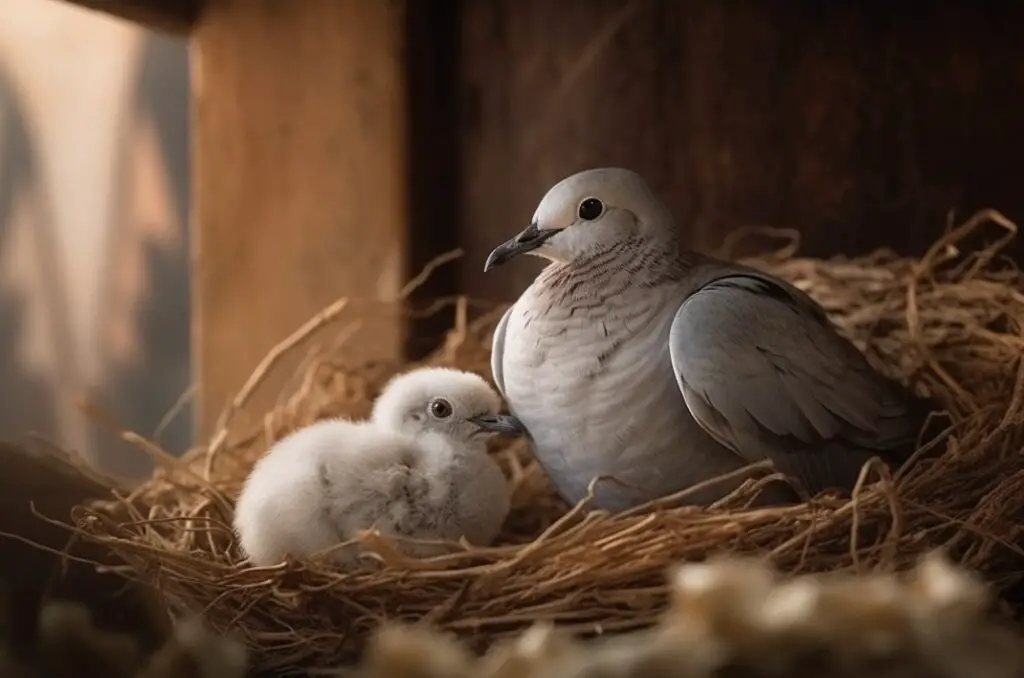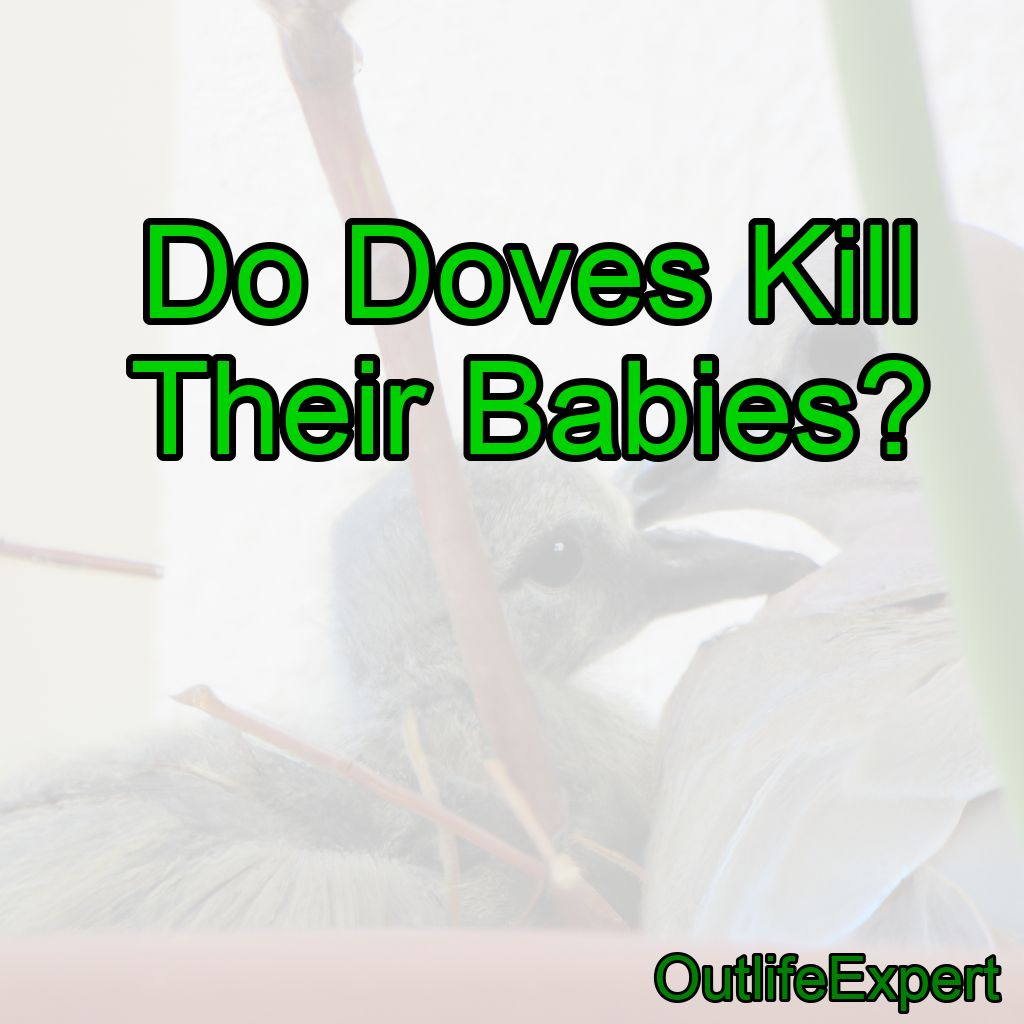Do doves kill their babies? The short answer is no, doves do not intentionally kill their babies. However, there are instances where baby doves may be accidentally harmed or killed by their parents.
In this blog post, I will explore the reasons behind this phenomenon and share my first-hand experiences with raising doves.
I will also provide tips on how to prevent such accidents from happening and discuss the natural behaviors of doves that may lead to misconceptions about them killing their young.
Infanticide and The Natural Behavior of Doves
Parental care is a crucial aspect of reproductive behavior in many avian species, including doves. As a biologist and backyard owner with experience observing these fascinating creatures, I have had the privilege of witnessing firsthand the complexities of their parental care strategies. In the case of doves, both parents are typically involved in raising their offspring, exhibiting a remarkable level of commitment and dedication.
Male and female doves often form strong pair bonds, working together to ensure the survival and well-being of their young. The process begins with the construction of a nest, which is a collaborative effort between the male and female.
I have observed these birds meticulously selecting suitable materials such as twigs, leaves, and feathers to create a cozy and secure environment for their eggs. It is truly remarkable to witness their attention to detail and the care they put into building a sturdy and well-insulated nest.
Once the nest is complete, the female dove usually takes on the primary role of incubation. Incubation is a critical stage in which the parent(s) provide warmth and protection to the developing embryos.

This duty requires constant dedication, as the eggs must be kept at an optimal temperature and protected from potential predators. As a backyard owner, I have had the privilege of witnessing the tireless efforts of dove parents as they take turns incubating the eggs, ensuring a consistent and nurturing environment.
After a period of incubation, the eggs hatch, and the real parental care begins. Both parents actively participate in feeding and protecting the hatchlings. I have often observed the adult doves taking turns foraging for food, diligently returning to the nest to regurgitate a nutritious substance known as “crop milk” to feed their hungry offspring.
This specialized secretion, rich in proteins and fats, provides essential nutrients for the rapid growth and development of the young doves.
However, as in any species, not all parental care in doves is positive. Infanticide, the killing of offspring, can occur in certain circumstances. While infanticide is relatively rare in doves, it has been observed in some cases.
It is believed to be a behavior associated with reproductive competition, where an intruding male may kill the offspring of another male to increase his chances of reproductive success with the female. Such behavior may also be driven by factors such as resource availability or genetic relatedness.
Although witnessing infanticide in doves is a distressing sight, it is important to remember that it is not a common occurrence and does not represent the typical parental care behavior of these birds. The majority of doves engage in cooperative parenting and invest significant time and effort into ensuring the survival of their young.
In conclusion, doves exhibit remarkable parental care strategies, with both males and females actively participating in nest-building, incubation, and feeding their offspring. The dedication and cooperation displayed by these birds are truly admirable.
While the rare occurrence of infanticide does exist within dove populations, it should not overshadow the overall commitment and nurturing behavior observed in the majority of these avian parents. As a biologist and backyard owner, I am constantly fascinated by the intricate dynamics of parental care in doves and continue to cherish the opportunity to witness these natural wonders in my own backyard.
The Mating and Nesting Process
Doves are monogamous birds, meaning that they form long-lasting bonds with their mates. They work together to build a nest, which is usually a simple, flimsy platform made of twigs and leaves. The nest is often built in trees, shrubs, or other elevated locations.
Once the nest is built, the female dove will lay one or two eggs. Both parents take turns incubating the eggs, with the male typically taking the day shift and the female taking the night shift. The eggs will hatch after about two weeks, and the resulting baby doves, called squabs, are born naked and blind.
Feeding and Caring for Baby Doves
Both parents work together to feed and care for the squabs. They produce a nutrient-rich substance called “pigeon milk” in their crop, a specialized pouch in their throat, which is then regurgitated and fed to the babies. This “milk” provides the squabs with essential nutrients and antibodies for their growth and development.
As the squabs grow, they begin to develop feathers and open their eyes. At around two weeks old, they will start to venture out of the nest and explore their surroundings. By the time they are about a month old, they are fully fledged and ready to leave the nest for good.
Circumstances That May Lead to Accidental Harm or Death of Baby Doves
Inexperienced or Distressed Parents
One of the main reasons baby doves may be accidentally harmed or killed by their parents is due to inexperience or stress.
First-time dove parents may not know how to properly care for their young, and this inexperience can lead to accidents. Additionally, if the parents feel threatened or stressed, they may inadvertently harm their squabs in an attempt to protect them or themselves.
In my personal experience, I once observed a pair of doves that nested in a tree near my home. The parents seemed quite young and inexperienced, and they built their nest in a rather precarious location. When a strong storm came through the area, the nest was knocked out of the tree, and the squabs fell to the ground. The parents were unable to care for their young properly, and unfortunately, the squabs did not survive.
Overcrowded Nests
Another potential reason for accidental harm or death of baby doves is overcrowding in the nest. Some doves may lay more eggs than their nest can comfortably accommodate, which can lead to the squabs being accidentally pushed out of the nest or smothered by their siblings or parents.
Predators and Other Threats
Doves and their young are prey to various predators, such as hawks, owls, snakes, and even mammals like raccoons and cats. If a predator attacks the nest, the parents may inadvertently harm their squabs while trying to defend them.
Tips for Preventing Accidents and Helping Doves Raise Their Young
Provide Safe Nesting Sites
If you have doves nesting in your yard, you can help prevent accidents by providing safe nesting sites for them. This can include installing nesting boxes or platforms in secure locations, away from predators and harsh weather conditions.
Minimize Disturbance
Doves can become stressed if they are frequently disturbed by humans or other animals. Try to minimize disturbance by keeping your distance from nesting sites and restraining pets that may pose a threat to the doves and their young.
Be a Responsible Birdwatcher
If you enjoy watching and observing doves, be responsible and respectful. Use binoculars to view them from a safe distance, and avoid getting too close to their nests or young. This will help reduce stress for the birds and decrease the likelihood of accidents.
Conclusion
In conclusion, doves do not intentionally kill their babies. However, accidents can occur due to inexperience, stress, overcrowded nests, and other factors.
By understanding the natural behaviors of doves and taking steps to provide safe nesting sites and minimize disturbance, we can help these beautiful birds raise their young successfully.
10 Facts About Doves and Their Babies
1. Doves are monogamous and form long-lasting bonds with their mates.
2. Both male and female doves participate in building the nest, incubating the eggs, and caring for the young.
3. Doves produce a nutrient-rich substance called “pigeon milk” to feed their squabs.
4. Baby doves, called squabs, are born naked and blind.
5. Squabs begin to explore outside the nest at around two weeks old and are fully fledged by one month of age.
6. Inexperience and stress are two main factors that can lead to accidental harm or death of baby doves.
7. Overcrowding in the nest can also result in accidents and harm to the squabs.
8. Predators, such as hawks, owls, and snakes, pose a significant threat to doves and their young.
9. Providing safe nesting sites and minimizing disturbance can help prevent accidents and ensure the successful raising of dove young.
10. Doves are a symbol of peace and love in many cultures.
FAQs
Why do baby mourning doves die?
Baby mourning doves can die due to a variety of reasons, including predation, disease, starvation, dehydration, and exposure to extreme weather conditions. Additionally, human interference such as handling or disturbing the nest can also lead to the death of baby mourning doves.
How can you tell if a dove nest is abandoned?
If a dove nest appears to be empty for several hours or even days, it is likely that it has been abandoned. Additionally, if there are no signs of activity or if the eggs inside the nest are cold to the touch, it is a good indication that the nest has been abandoned.
What happens when a baby bird dies in the nest?
When a baby bird dies in the nest, the parents may continue to care for it for a short period of time before removing it from the nest. The dead bird will decompose and eventually be absorbed into the nest material or fall out of the nest. The parents may also abandon the nest if all of their offspring have died.
Do doves leave their babies unattended at night?
Yes, doves typically leave their babies unattended at night. The parents will roost nearby, but they do not stay with the babies constantly.
How long do doves leave their babies?
Doves typically leave their babies after about two weeks, once the babies are able to regulate their own body temperature and are able to fly short distances.
Why did my baby dove died?
Without more information about the circumstances surrounding the death of the baby dove, it is impossible to determine the exact cause. However, common reasons for the death of baby doves include inadequate nutrition, exposure to extreme temperatures, predation, and disease.




